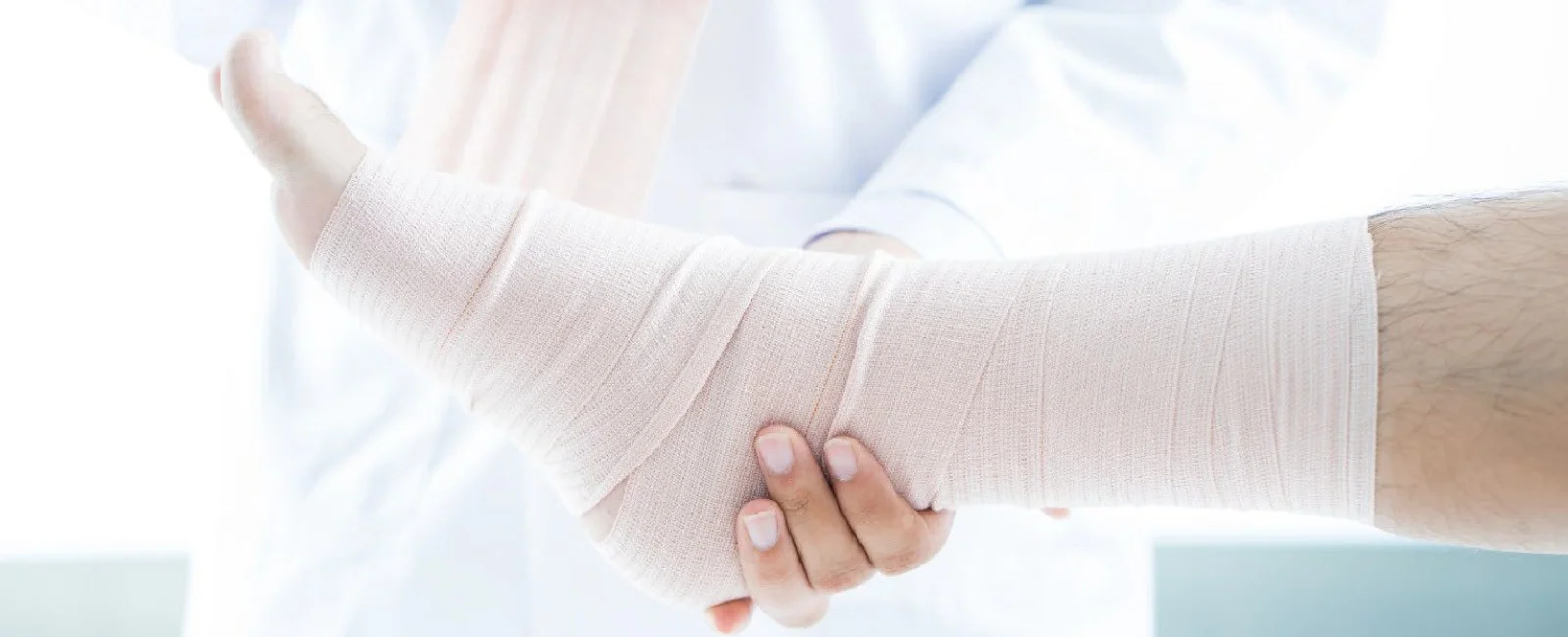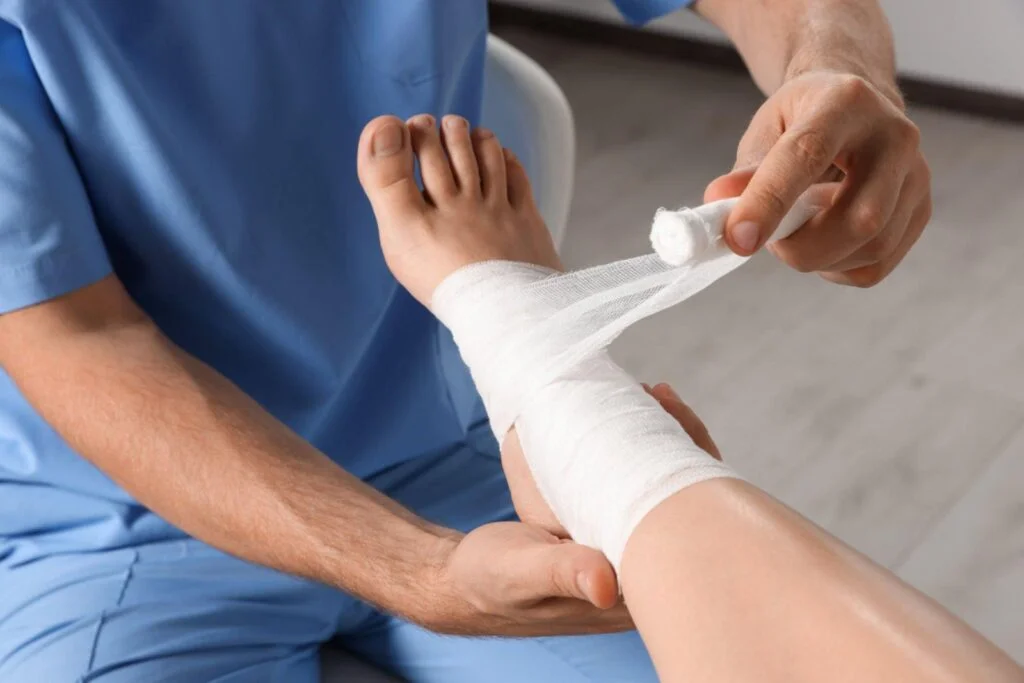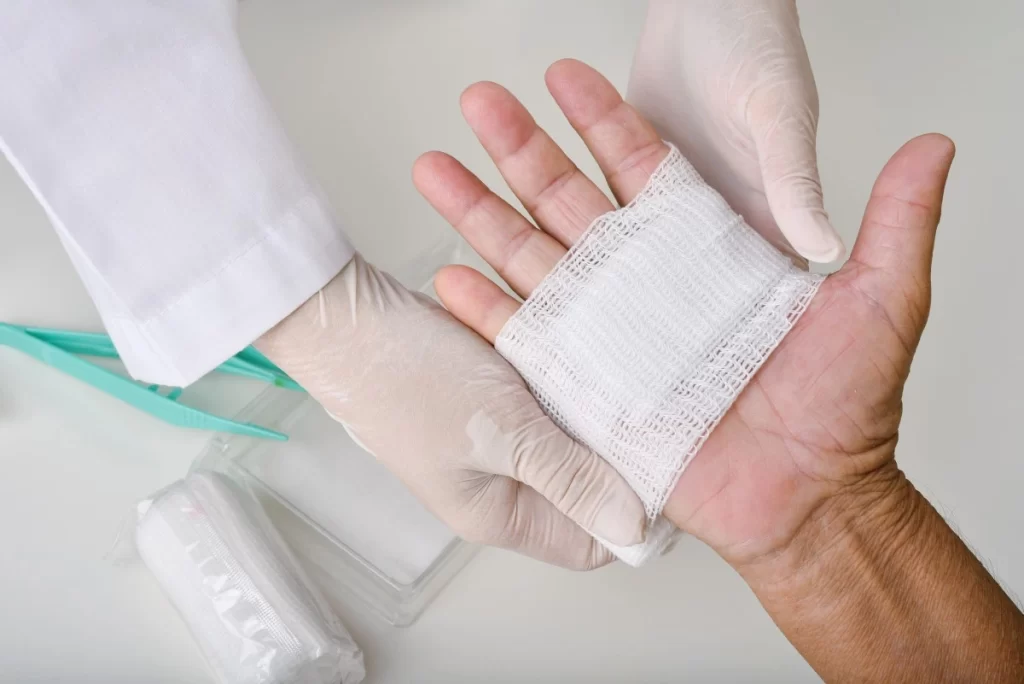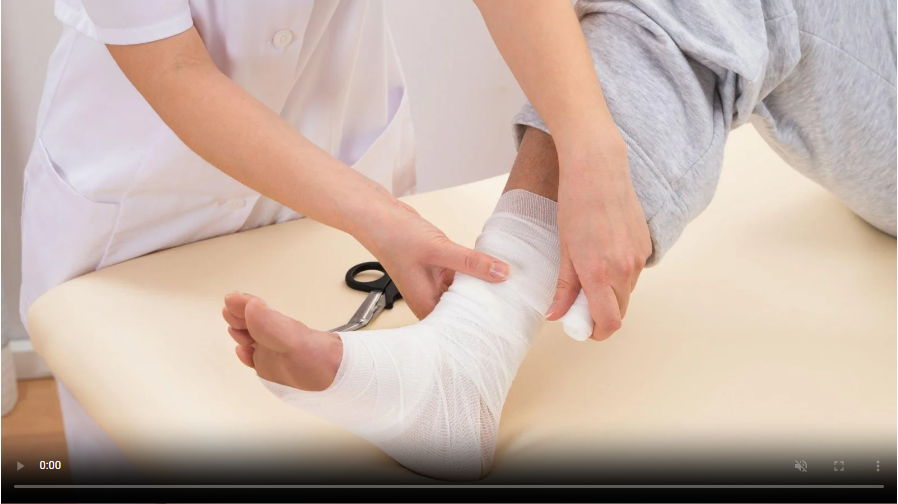Expert Wound Care Management : Advanced Solutions Tailored for You


Your Path to Faster Healing Starts Here - Explore Wound Care Management!
WOUND CARE Q&A


WHAT IS WOUND CARE?
Wound care is a specialized area of healthcare dedicated to the management and treatment of injuries, cuts, and other wounds to promote faster healing and prevent complications. The primary goals of wound care management are to minimize the risk of infection, alleviate pain, and support the body’s natural healing processes. At our clinic, our foot wound care specialist in Kansas provides expert care for a variety of foot wounds, including diabetic foot ulcers.
Key Steps in Wound Care:
- Assessment: Our foot wound care specialist in Kansas assesses the type, size, and severity of the wound, along with any underlying conditions that might affect proper wound care and healing, ensuring the most effective advanced wound care for feet.
2. Cleaning and Debridement: Cleaning the wound is essential for removing debris, foreign particles, and dead tissue to prevent infection. Debridement, when needed, eliminates necrotic or non-viable tissue, facilitating faster wound healing and improving outcomes in diabetic foot wound treatment in Wichita, Kansas.
3. Dressing and Bandaging: Proper wound care includes applying suitable dressings and bandages to protect the wound, control bleeding, and create an ideal healing environment. The choice of dressing depends on the wound type and specific needs.
4. Infection Prevention: Antibiotics or antiseptics may be used to prevent or treat infections, particularly in wounds at higher risk of bacterial contamination. This is especially important when learning how to treat foot ulcers effectively.
5. Monitoring and Follow-Up: Regular monitoring of wound progress is a critical part of wound care management. Healthcare providers may adjust the treatment plan based on the wound’s healing response, ensuring successful recovery.
6. Patient Education: Educating patients on proper wound care practices at home, such as maintaining hygiene and recognizing early signs of infection, is vital for successful recovery and long-term foot health.


Common Causes of Foot Wounds
Foot wounds can occur for various reasons. Understanding the common causes can help you take steps to prevent them and seek appropriate care when necessary.
Common Causes of Foot Wounds Include:
- Trauma : This is the most common cause of foot wounds. It can be caused by anything that injures the foot, such as a fall, stepping on a sharp object, or wearing ill-fitting shoes.
- Diabetes : Diabetes significantly increases the risk of foot wounds by damaging the nerves and blood vessels in the feet. This can lead to delayed healing, poor circulation, and numbness.
- Poor Circulation : Reduced oxygen and nutrient delivery to the feet due to poor circulation hinders healing and makes the skin vulnerable to wounds. Proper wound care is vital in such cases to promote recovery.
- Arthritis: Arthritis limits proper foot movement, increasing the risk of friction and pressure, which can cause skin damage and foot wounds.
- Aging : Aging naturally affects skin integrity and foot health, making older individuals more susceptible to wounds. Regular checkups at a wound care unit can help in prevention.
- Infections : Bacterial, fungal, or other skin infections can lead to foot wounds, especially in individuals with weakened immune systems.
Understanding these causes allows for proactive steps, such as regular foot examinations, maintaining proper hygiene, and making lifestyle adjustments, to reduce the risk of foot wounds. If you have underlying conditions such as diabetes or poor circulation, it’s essential to monitor your feet regularly and seek professional care for any wounds.


How to Reduce the Risk of Foot Wounds
Preventing foot wounds is possible with proper care and attention to foot health. By following these tips, you can reduce your risk of developing wounds and promote better healing overall under the guidance of a foot wound care specialist in Wichita, Kansas.
Here are some key factors to help minimize the risk of foot wounds:
- Inspect Your Feet Daily: Look for any cuts, sores, bruises, or other changes in the skin or nails. Pay particular attention to the areas between your toes and the bottoms of your feet to catch issues early and learn how to treat foot ulcers promptly if needed.
- Wear Well-Fitting Shoes: Shoes should be comfortable, supportive, and fit well. Avoid shoes that are too tight, too loose, uncomfortable, or have high heels. Ensure your shoes provide good cushioning and support for the arches of your feet, helping prevent injuries that may require advanced wound care for feet.
- Keep Your Feet Clean and Dry: Wash your feet daily with soap and water, and dry them thoroughly between the toes. Avoid using harsh soaps or detergents. Moisturize your feet regularly to keep them hydrated and prevent cracking.
- Trim Your Toenails Straight Across: Do not cut them too short, and avoid filing the corners. This can help prevent ingrown toenails that could lead to wounds requiring diabetic foot wound treatment in Wichita, Kansas.
- Control Your Blood Sugar Levels: If you have diabetes, controlling your blood sugar levels is essential to prevent nerve and blood vessel damage, which can increase the risk of foot wounds.
- Maintain a Healthy Diet: A well-balanced diet supports overall health, including foot health. Adequate nutrients contribute to skin integrity and wound healing.
- Stay Hydrated: Proper hydration is essential for skin health. Drink enough water to maintain overall hydration, which helps prevent dry and cracked skin.
At Foot & Ankle Surgeons of Kansas, we emphasize the importance of daily foot care and regular check-ups with a foot wound care specialist in Kansas to keep your feet healthy and free from wounds.


WHICH WOUND CARE SOLUTIONS ARE RIGHT FOR ME?
Determining the best wound care solution depends on your specific condition. At Foot & Ankle Surgeons of Wichita, Kansas, our foot wound care specialist in Kansas provides personalized wound care treatment plans based on factors such as the type of wound, its severity, and your overall health.
Here are some common wound care treatments that you may consider:
Dressings: Proper wound care often begins with the use of dressings to cover and protect the wound, absorb exudate (fluid from the wound), and promote healing. There are many types of dressings available, including hydrocolloid, alginate, and silver-impregnated dressings, all designed to support advanced wound care for feet.
Ointments and Creams: Ointments and creams are used to keep the wound moist and protect it from infection, which is essential when learning how to treat foot ulcers effectively.
Debridement: The removal of dead tissue is a critical part of wound care management. This can be done surgically, with enzymes, or through autolytic debridement (using the body’s natural healing processes) to improve outcomes in diabetic foot wound treatment in Kansas.
Surgical Interventions: In more severe cases, surgery may be required for effective wound care treatment. This might include removing dead tissue, closing the wound, or repairing damaged bone or muscle.
Each treatment plan is tailored to your specific needs and conditions, ensuring that you receive the best possible care from our foot wound care specialist in Kansas.


Available Wound Care Treatments in Wichita, Kansas
At Foot & Ankle Surgeons of Kansas, we offer a range of advanced wound care for feet treatments designed to accelerate healing and prevent complications. Our treatments are tailored to each patient’s needs, ensuring the best possible results under the guidance of a foot wound care specialist in Kansas.
Specialized Wound Care Treatments Include:
Advanced Dressings: Our wound care unit uses advanced dressings, including hydrogels, hydrocolloids, and foam dressings, to create an optimal healing environment. These dressings help maintain moisture balance, protect against infections, and promote tissue regeneration, ensuring proper wound care and effective management of foot ulcers.
Negative Pressure Wound Therapy (NPWT): Using innovative technology, our wound care specialists may recommend NPWT. This therapy involves a vacuum dressing to enhance healing by reducing swelling, removing excess fluid, and stimulating the formation of granulation tissue for diabetic foot wound treatment in Kansas.
Bioengineered Skin Substitutes: In cases where traditional wound healing methods may be insufficient, our specialists may leverage bioengineered skin substitutes. These advanced products are designed to promote tissue regeneration and accelerate the closure of complex wounds, supporting advanced wound care for feet.
Compression Therapy: Ideal for wounds caused by venous insufficiency or venous ulcers, compression therapy improves blood circulation and reduces swelling.
Wound Debridement: Our wound care specialists are proficient in various debridement techniques, including surgical debridement and enzymatic debridement, to remove necrotic or damaged tissue and create a conducive environment for healing.
Offloading Devices: For patients with foot wounds, such as those caused by diabetes, we prescribe offloading devices like specialized footwear or custom orthotic inserts. These devices help reduce pressure on vulnerable areas, promoting recovery and preventing further complications.
Patient Education and Follow-Up: We prioritize patient education, equipping individuals with the knowledge and tools for ongoing self-care. Regular follow-up appointments ensure treatment plans are adjusted as needed for the best possible outcomes.
Our dedicated team of foot wound care specialists in Kansas will work with you to determine the most appropriate treatment plan based on your unique needs and condition.
If you are experiencing a foot wound or have concerns about your foot health, contact Foot & Ankle Surgeons of Kansas in Wichita today. Our team is here to help you with compassionate, comprehensive care and guidance on how to treat foot ulcers, ensuring the best possible outcome for your healing process.



